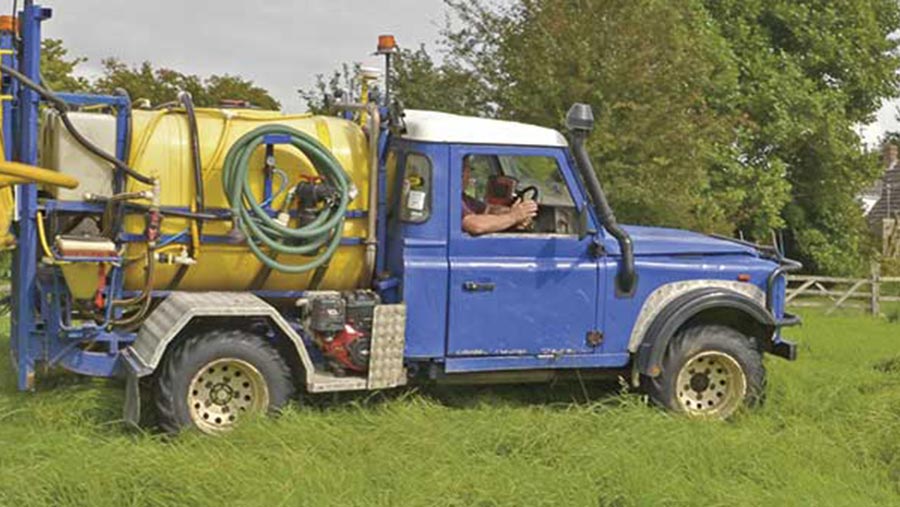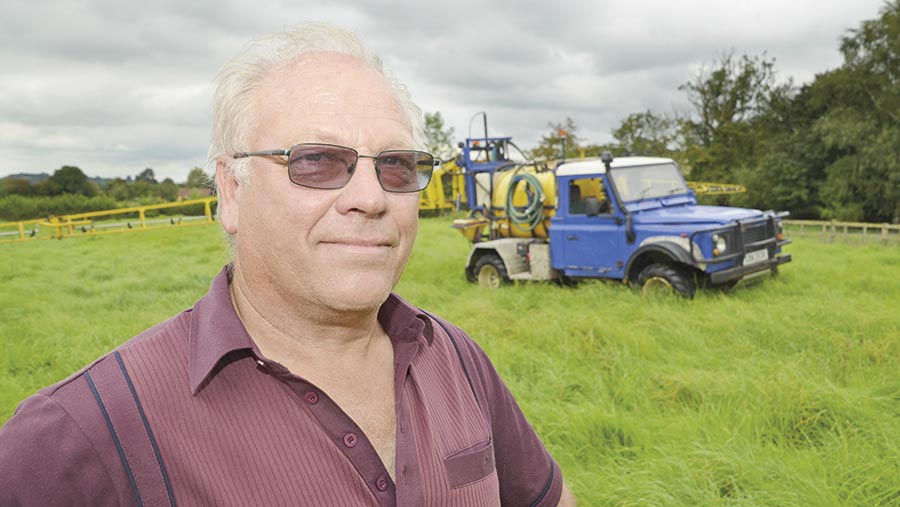Converting 4x4s to red diesel – how to stay road legal
 © Nick Fone
© Nick Fone Land Rovers and pickups are an indispensable part of all farm businesses and if you’re using them for specific tasks then it might pay to convert them to full agricultural use and run on red diesel.
However, it’s not a decision to be taken lightly and you need to give proper thought to the vehicle’s role on the farm before you commit.
Changing the taxation class can mean taking apart the core structure of the vehicle and you must be willing to constrain its use strictly to agricultural operations.
In doing so, it will become an integral part of your (mainly) off-road agricultural fleet and therefore has some very specific and important limits on use.
This does not include using it to race down to your local ag dealer to pick up spare parts or to fetch rations to feed the harvest team.
See also: Dissecting red diesel rules
Safety
Safety must also considered because any vehicle driven on the road (even under agricultural use) must still be roadworthy, regardless of whether an MOT is legally required or not.
If an accident occurs, or you are pulled over, enforcement agencies will not look favourably on an unsound vehicle so this should be taken into account when making decisions about a change of use.
Likewise, even if all use is off-road, the vehicle must be properly maintained and safe for the operator.
Assuming you have confidence in the roadworthiness of the vehicle and have a specific use in mind, there are three classification options to make your farm 4×4 cheaper to run:
- Fully off-road, on a SORN
- Limited use vehicle
- Agricultural machine
Each option has its limitations on use and requires the vehicle to be registered with the DVLA first. However, if it is solely used for agriculture, horticulture or forestry, it will be zero-rated.
1. Fully off-road, on a SORN
If you have a ring-fenced farm and can keep the truck entirely off road, it might be worth applying to the DVLA for a Statutory Off Road Notification (SORN).
However, you should note that it is a criminal offence to use a vehicle on a public road that is not registered with the DVLA or has a SORN, so consider this option only if all your driving is off road.
To apply for a SORN, use the 11-digit number from the vehicle’s log book (V5C) to take it off the road immediately.
Alternatively, use the 16-digit number on your vehicle tax reminder letter (V11) to take it off the road from the first day of the following month.
If you have a SORN, the vehicle can be run on red diesel and unlicensed vehicles that do not require a SORN (including unregistered vehicles that have never used the public road) can also use red diesel without a SORN declaration if kept off road.
But be warned – if you venture onto a public road the fuel type will be irrelevant if you are caught.
It’s also worth noting that you do not need to insure your vehicle if it has a SORN.
2. Limited use vehicle
If you only want to travel very short distances on the road then you can choose to limit the vehicle use and re-tax it as a “vehicle used between different parts of land”.
This means you are zero-rated, provided the vehicle is used only for agriculture, horticulture or forestry, is used only on public roads to pass between different areas of land occupied by yourself and, crucially, the distance travelled on public roads in passing between these two parcels of land does not exceed 1.5km.
Such a vehicle can use red diesel, although to remain exempted from an MOT it is also limited to travelling no more than six miles per week.
This is a useful category if you have a few local pockets of land.
3. Agricultural machine
If you are prepared to take the plunge and want a fully taxed agricultural machine that is run on red diesel to carry out a specific agricultural operation such as spraying then you can apply to change the taxation class to an agricultural machine.
However, this requires a commitment to ensure that the 4×4 cannot be used as a passenger vehicle and will only be used for work in three sectors: agriculture, horticultural or forestry.
This scenario can be a minefield, so don’t be surprised if you are told to remove the back seats and seatbelts to be sure that the vehicle meets important criteria for agricultural use.
You’ll also have to prove that this is a permanent and fixed conversion, leaving the vehicle unable to carry passengers or a load unrelated to the operation.
The converted vehicle is likely to be classified as an agricultural engine, which is a machine specially designed or converted to perform an agricultural operation on the land.
This means it must be used solely for purposes relating to agriculture, horticulture or forestry, can travel only on public roads to and from the worked land, and does not carry any load deemed unnecessary for the job.
The tax category is zero-rated but you must still go through the application process with the DVLA to register the vehicle.
You will be expected to provide photographs and this can be a difficult and lengthy process depending upon the proposed use and level of conversion.
If the vehicle is successfully taxed, red diesel can be used, provided it is solely for agricultural use and fits the criteria of the rebated fuel Memorandum of Agreement.
An MOT is no longer required but the vehicle must be roadworthy (and an MOT can be a good way of proving this).
Commenting, a spokesperson for the National Association of Agricultural Contractors (NAAC) said: “Rebated fuel is critical for our industry, particularly with the current financial instability surrounding Brexit.
“It is vital that the industry uses the fuel carefully, within the agricultural exemptions, so that our work is not called into question – potential tax evasion is never far from the government’s radar.
“We must remain ‘whiter than white’ and anyone seeking to change a 4×4’s use must be absolutely clear that this is not a route to broadening a vehicle’s use, but a significant restriction to mainly off-road, targeted agricultural operations.”
Case study

Richard Ayles © Nick Fone
In recent years, it has become more challenging to get vehicles taxed for agricultural use and rules have been tightened to ensure that only legitimate conversions can be run as agricultural machines.
Contractor Richard Ayles has been successfully running bespoke Land Rovers for over 26 years for his grassland spraying business, Richard Ayles CropCare, in Somerset.
Mr Ayles is on his fourth conversion, which involved a team of fabricators and spraying experts putting a 16m hydraulic nozzle boom and tank onto the back of a high-capacity Land Rover Defender.
The sprayer is not demountable and is permanently welded onto the back of the vehicle. The passenger seats and seatbelts have been removed, leaving a single seat for Richard, who can then work in relative comfort and safety in the cab. He also gets the benefit of front suspension and four-wheel braking.
Small field sizes, narrow gateways and difficult-to-access roads have made this a viable option for the business.
“The average field size in this area is 4.7ha and I have a 1,000-litre tank on the pickup that can spray approximately 5ha to 6ha, which covers all I need comfortably. The vehicles are small and easily manoeuvred, great off road, while still giving me a comfortable ride between jobs.”

